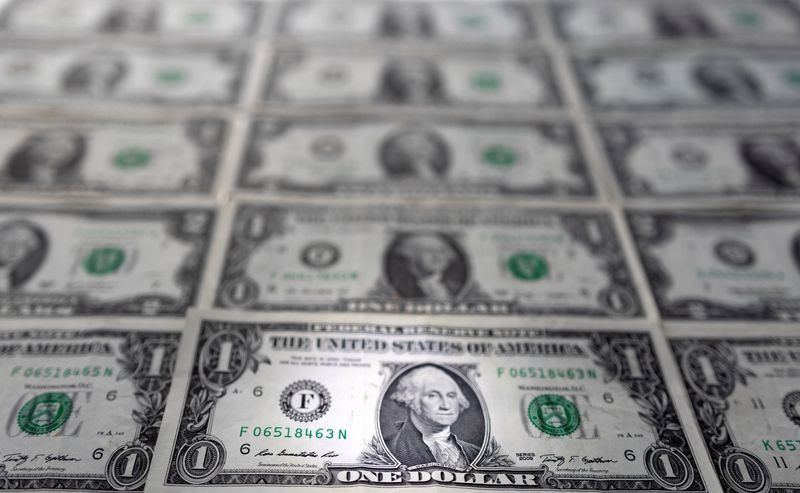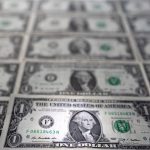NEW YORK (Reuters) -The dollar dropped on Wednesday after data showed that consumer prices in May rose less than economists expected, but pared losses after updated interest rate projections by Federal Reserve officials showed an expectation for only one rate cut this year.
The headline consumer price index (CPI) was flat on the month, below expectations for a 0.1% gain. Core prices rose by 0.2%, below economists’ projections for a 0.3% increase.
That bolstered expectations that the U.S. central bank will make two 25-basis-point rate cuts this year, with the first likely coming in September. But the Fed’s “dot plot” showing only one cut this year has clouded that view.
“Fed members clearly weren’t swayed by today’s CPI report, or were reticent to make a last-minute change to their forecast,” said Adam Button, chief currency analyst at ForexLive in Toronto.
Fed policymakers as of March had projected three rate cuts this year. The U.S. central bank on Wednesday also pushed out the start of rate cuts to perhaps as late as December.
Fed Chair Jerome Powell said after the meeting that the interest rate forecast is “fairly conservative” and may not be borne out by coming data, and is subject to revision.
But he was not as forthright about the possibility of a rate cut in September as some investors had expected.
“Many in the market thought Powell might begin to tee up a September rate cut, and instead he hasn’t offered any kind of fresh hint on easing,” Button said. “That’s led to some U.S. dollar buying.”
The dollar index was last down 0.5% on the day at 104.73, after earlier falling to 104.25. It reached a four-week high of 105.46 on Tuesday.
The greenback was also pulled lower as the benchmark 10-year Treasury yield briefly hit its lowest level since April 1 at 4.25%.
Fed funds future traders are now pricing in a 63% probability of an interest rate cut by September, down from more than 70% earlier on Wednesday, according to CME Group’s (NASDAQ:CME) FedWatch Tool.
Rate-cut expectations have been volatile in the past week, with traders reducing bets on a cut in September after Friday’s U.S. jobs report for May showed that employers added more jobs than expected during the month. Wage inflation also rose more than was anticipated.
Producer price data on Thursday is the next focus for clues on the likely trajectory of the personal consumption expenditures price index (PCE), the Fed’s preferred inflation indicator.
“A soft number there could tilt risks towards a low core PCE number at the end of the month,” said Shaun Osborne, chief foreign exchange strategist at Scotiabank in Toronto.
The euro gained 0.63% to $1.0807 and got as high as $1.0852. It had fallen to $1.07195 on Tuesday, the lowest level since May 2.
The single currency has been under pressure after far-right parties gained ground in European Parliament elections, prompting French President Emmanuel Macron to call a snap election in his country, to be held in two rounds on June 30 and July 7.
Macron reaffirmed on Wednesday that he would not resign if his camp does not win the election. Marine Le Pen’s National Rally is France’s most popular party ahead of the parliamentary elections.
The Bank of Japan also meets this week, and it is widely expected to keep interest rates steady and consider whether to offer clearer guidance on how it plans to reduce its huge balance sheet.
The dollar fell 0.17% to 156.8 yen after trading at a one-week high of 157.40 on Tuesday.

The yen’s decline to a 34-year low of 160.245 per dollar at the end of April triggered several rounds of official Japanese intervention totaling 9.79 trillion yen ($62 billion).
In cryptocurrencies, bitcoin gained 1.85% to $68,527.
To read the full article, Click Here

